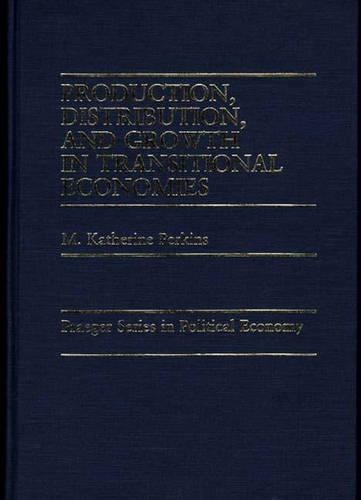
Production, Distribution, and Growth in Transitional Economies
(Hardback)
Publishing Details
Production, Distribution, and Growth in Transitional Economies
By (Author) M. Katherine Perkins
Bloomsbury Publishing PLC
Praeger Publishers Inc
26th September 1988
United States
Classifications
Tertiary Education
Non Fiction
330.1
Physical Properties
Hardback
172
Description
Perkins argues that development theory can be improved by considering the causal effects of precapitalist structures in developing countries on their transition to capitalism. Applying French Structuralist analysis, she proposes a theoretical framework tying production relations to key issues in development. The opening chapters review and critique French structuralist thought. The book also examines the structuralist theory of production modes, the concept of economic calculation, a new theory of prices, inflation in developing countries, and agricultural credit expansion, export subsidies, tenancy and labor laws, and land taxation. Finally, Perkins invites others to transcend the limits of orthodox thinking and to seek creative solutions to the problems of underdevelopment.
Reviews
The book, by an American political economist on the faculty of Howard University, is a theoretical critique of underdevelopment. She seeks to synthesize the Anglo-American Marxists' ideas emphasizing the origins of capitalism with the French Structuralist Marxism of Althusser's followers who emphasize the transition to socialism. Perkins believes that the work of the French Marxists has been ignored or misunderstood by English-speaking colleagues. Many authors' works are discussed in the book, including Charles Bettelheim, Etienne Balibar, and Pierre-Philippe Rey. As the author sets forth her approach to underdevelopment, she discusses such concepts as transitional mode of production, transitional social formation, dissimulation, and economic calculation, distinguishing between synchronic and diachronic structures. The problem of external relations is also addressed. Chapter endnotes and a selected bibliography. Accessible to graduate students and faculty.-Choice
"The book, by an American political economist on the faculty of Howard University, is a theoretical critique of underdevelopment. She seeks to synthesize the Anglo-American Marxists' ideas emphasizing the origins of capitalism with the French Structuralist Marxism of Althusser's followers who emphasize the transition to socialism. Perkins believes that the work of the French Marxists has been ignored or misunderstood by English-speaking colleagues. Many authors' works are discussed in the book, including Charles Bettelheim, Etienne Balibar, and Pierre-Philippe Rey. As the author sets forth her approach to underdevelopment, she discusses such concepts as transitional mode of production, transitional social formation, dissimulation, and economic calculation, distinguishing between synchronic and diachronic structures. The problem of external relations is also addressed. Chapter endnotes and a selected bibliography. Accessible to graduate students and faculty."-Choice
Author Bio
M. KATHERINE PERKINS is an internationally known development economist. Dr. Perkins is graduate professor of Economics at Howard University in Washington, D.C., where she has been lecturing in the areas of international trade and development since 1981.
